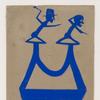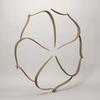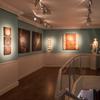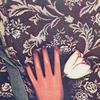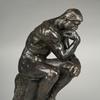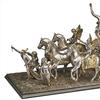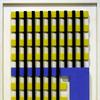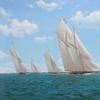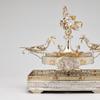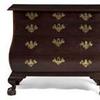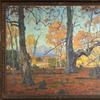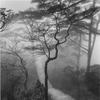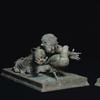Konstantin Simun: The Sacred in the Profane opens at Museum of Russian Icons
- CLINTON, Massachusetts
- /
- February 13, 2019
Internationally-known Russian artist Konstantin Simun often poses the question “trash or treasure?” when speaking of his sculptures made from found objects–plastic bottles, recycling bins, milk crates, and, even, discarded briefcases. Simun says “I see art everywhere I look. Sometimes people ask me how I work, and I say: ‘I’m just cleaning the street.' But everything I pick up either is, or it becomes, a work of art.”
Presented in partnership with the Fitchburg Art Museum, Konstantin Simun: The Sacred in the Profane will be on view at The Museum of Russian Icons, February 22 – June 30, 2019. Simun, who has been living and working in Boston for the past 30 years, sees spiritual images in everyday plastic items, drawing unexpected connections between iconography and consumer products. Famous around the world for his monumental sculpture The Broken Ring, a memorial to the end of the siege of Leningrad during World War II, Simun is known locally for his charming memorial to the Puppeteer Igor Fokin in Harvard Square and works exhibited at the deCordova and Fuller Craft museums.
The Sacred in the Profane, curated by Fitchburg Art Museum Curator Lisa Crossman, offers a survey of Simun’s unique capacity to find iconographic forms in molded plastic and other consumer objects. Viewed within the Museum of Russian Icons, it is possible to contemplate Simun’s exposure to the icon tradition, as well as to consider the way in which Simun’s story of discovery and fascination with plastic parallels the Museum of Russian Icons founder and former president of Nypro Plastics Gordon B. Lankton’s connoisseurship of icons.
“Simun asks us to see spiritual images in banal plastic vessels such as milk jugs and crates,” says Crossman. “He accomplishes this through a slight alteration to the original form, a shift in orientation, or the fusing of one object with another. These objects are so ubiquitous and ordinary that we rarely stop to consider their formal qualities, let alone contemplate them as symbolic or transcendent objects. Simun’s fascination with plastic did not diminish over the years, and he continues to create artworks not only from plastic, but also in traditional materials like bronze, silver, and ceramic that replicate the visages that he sees in plastic.”
According to Simun, “A bottle as a vessel is one of the most ancient of mankind’s inventions and its form always corresponded to its time absorbing the relevant culture while retaining something of the preceding one. The form of contemporary American plastic vessels is the result of long development and accumulation. In a plastic bottle, I saw, for instance, the forms that might belong to Ancient Greece, Rome, or the Peru and American cultures. In my works, it is easy to see these cultures being reanimated. The light seems to be cast on the roots and origins of the forms absorbed in the design of contemporary plastic bottles.”
“When I came to America, I saw trash on the street, which was so foreign to me,” he continues. “Also, the trash here was so interesting–colorful, almost like toys. And the technology in something as simple as a plastic bottle — it’s incredible.”
ABOUT THE ARTIST
Konstantin Simun was born in Leningrad, USSR, in 1934 and immigrated to the United States in 1988, settling in Boston’s Allston neighborhood. In St. Petersburg, Russia and internationally, he’s known for such monumental sculptures as The Broken Ring (1966), the official state memorial to the Nazi siege of Leningrad and one of the most significant memorials of World War II.
Before moving to the United States, Simun’s artworks were executed in traditional materials such as bronze, plaster, wood, and stone. His production included academic work that was accepted by state institutions and other vanguard pieces that strayed, even disturbed, the academy and reflect his interest in modernism and experimentation.
After emigrating, he has principally produced work using found plastic and other consumer objects. This shift embodied the cultural shock experienced by an artist of his generation, formed in virtually complete isolation from the West. He did not try to hide his inspiration from encounters with American culture. Rather, he began to create readymade totems of industrial forms.
Simun's works have been widely exhibited throughout Russia and the United States; and are in the permanent collections of Russia's largest museums, such as the State Tretyakov Gallery in Moscow, the State Russian Museum in St. Petersburg, and the Perm Gallery in Perm, as well as in private collections.
He is a recipient of many awards, including the International Diaghilev Prize "For Devotion to Art," as well as the Ludwig Vogelstein Foundation and the Pollack-Krasner Foundation awards.
His work Totem: America was exhibited at the deCordova Sculpture Park and Museum, from 1993-2002; and has been on view at the Fuller Craft Museum, and more recently at TurnPark in the Berkshires. His work Doo-Doo—a memorial to Puppeteer Igor Fokin, installed in Harvard Square, Cambridge–is beloved by residents and visitors to the city.
ABOUT THE CURATOR
Lisa Crossman, Ph.D., is the curator at the Fitchburg Art Museum. As curator, she oversees changing exhibitions of work by contemporary New England artists and those featured in the permanent collection. In addition, she collaborates with Fitchburg State University’s faculty and students, and curators of other regional museums. Prior to FAM, Crossman worked with the Cultural Agents Initiative at Harvard University, taught at Middlebury College and St. Michael’s College, and served as a Research Associate at the New Orleans Museum of Art. Her doctoral work and later professional experiences have solidified her interest in supporting contemporary artists and creating links among art museums, universities, and community partners. Exhibitions on view at FAM this winter include Fire and Light: Otto Piene in Groton, 1983–2014, and Broad Strokes: American Painting of the Late 19th and Early 20th Centuries from the FAM Collection. Visit www.fitchburgartmuseum.org for more information.
RELATED PROGRAMMING
Pop-up Makerspace: Plastics!
Tuesday, February 19 – Sunday, February 24, 11:00am-5:00pm, Free with Admission
Recycle your used plastic (milk jugs, yogurt containers, plastic bags, anything that can be repurposed) and create a work of art at the same time This edition of the Museum’s Pop-up Makerspace encourages children and families to find a second purpose for their single-use plastics that would otherwise end up in a landfill.
Opening Reception: Konstantin Simun: The Sacred in the Profane
February 21, 2019, 6:00-8:00pm
MoRI and FAM members free, nonmembers $15
Please RSVP by Tuesday, February 19, 978.598.5000 x121
Please join us as we celebrate the opening of Konstantin Simun: The Sacred in the Profane, presented in partnership with the Fitchburg Art Museum. Internationally known sculpture Konstantin Simun has a unique capacity to find forms from ancient art and Christian iconography in ordinary consumer objects. Wine and hors d’oeuvres will be provided, and exhibition Curator Lisa Crossman will give remarks.
Interactive Lecture–Amulets, Talismans, & Reliquaries: The Power of Adornment and Significance of Found Objects as Material and Magic with artist and Professor Kendall Reiss
Saturday, March 9, 1:00-4:00pm, Members free, Nonmembers $12. Advance registration required. Call 978.598.5000.
Join artist and professor Kendall Reiss and Museum registrar Laura Garrity-Arquitt for a presentation of found object jewelry and adornments from a range of cultures and historical periods that will offer context for the rest of the day’s discussions. Participants will be invited to closely observe a selection of objects from the Museum of Russian Icon’s permanent collection and hear from registrar Laura on these objects relationship to larger themes of found, discarded, and recycled materials in art.
Curator’s Talk with Lisa Crossman
Saturday, March 23, 2:00pm, Free with Admission
Fitchburg Art Museum Curator Lisa Crossman will take an engaging look at the art of Konstantin Simun in his latest exhibition The Sacred in the Profane. In his work, Simun poses the question “trash or treasure?” when speaking about his sculptures. Explore why Simun asks the viewer to see spiritual images in everyday plastic objects and the connections between iconography and consumer products.
ABOUT THE MUSEUM
The Museum of Russian Icons inspires the appreciation and study of Russian culture by collecting and exhibiting icons and related objects; igniting the interest of national and international audiences; and offering interactive educational programs. The Museum serves as a leading center for research and scholarship through the Center for Icon Studies and other institutional collaborations. It is the only museum in the US dedicated to Russian icons, and it is the largest collection of icons outside of Russia.
Museum hours: Tuesday–Friday, 11AM to 4PM; Saturday and Sunday, 11AM to 5PM. First Sunday of the month: free admission! Closed Mondays.
Admission: Adults $10, seniors (59+) $7, Students $5, Children (3-7) $5, Children under 3 Free.
For more information, please visit museumofrussianicons.org. Follow the Museum of Russian Icons on Facebook, Twitter, and Instagram.
Contact:
Nina BergerMuseum of Russian Icons
6175431595
ninajberger@gmail.com
203 Union Street
Clinton, Massachusetts
info@museumofrussianicons.org
978.598.5000
http://www.museumofrussianicons.org/
About Museum of Russian Icons
The Museum of Russian Icons inspires the appreciation and study of Russian culture by collecting and exhibiting icons and related objects; igniting the interest of national and international audiences; and offering interactive educational programs. The Museum serves as a leading center for research and scholarship through the Center for Icon Studies and other institutional collaborations. It is the only museum in the US dedicated to Russian icons, and it is the largest collection of icons outside of Russia. Museum hours: Tue. - Fri., 11AM to 4PM, first Thurs of the month to 8PM, Saturday and Sunday 11AM to 5PM, closed Mondays. Admission: Adults $10, seniors (59+) $7, Students $5, Children (3-7) $5, Children under 3 Free. For more information please visit museumofrussianicons.org.


